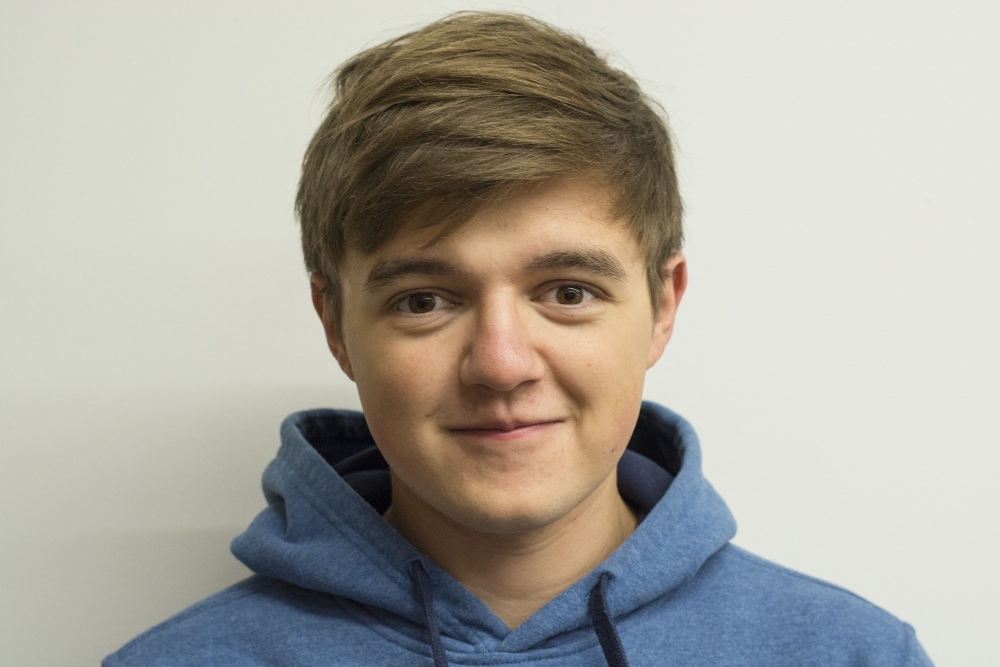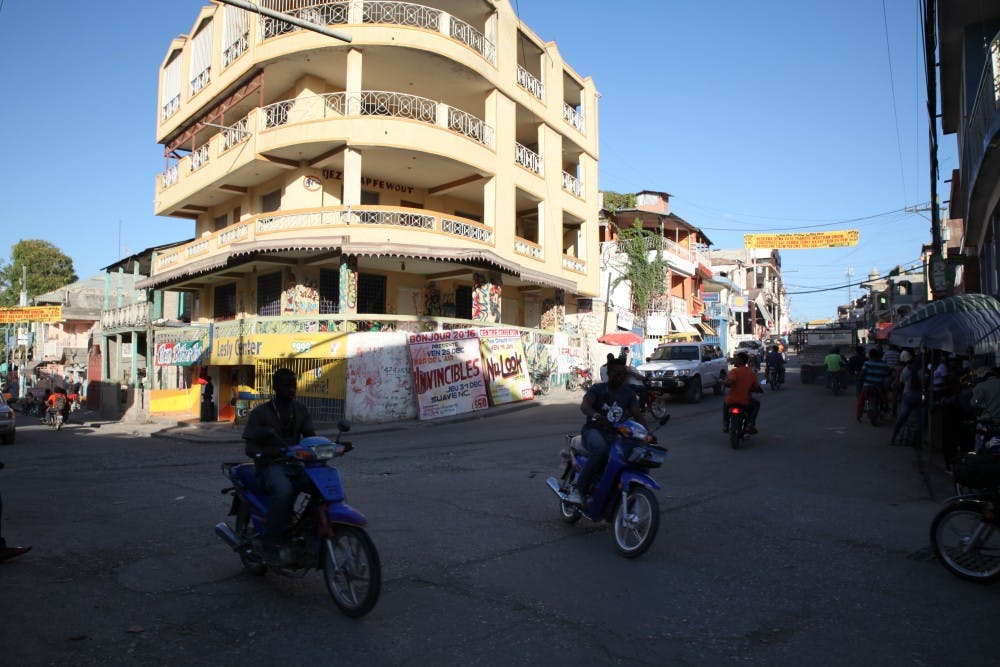Trent Scroggins is a sophomore photojournalism, religious studies and philosophy major and writes 'There and Back' for the Daily News. His views do not necessarily agree with those of the newspaper. Write to Trent at tbscroggins@bsu.edu.
Walking the streets of La Saline, Port-au-Prince, Haiti, I dodge motorbikes, stepping into gutters where pavement repeatedly ends. This is an area known for its unpredictable violence, forcing me to grip my camera as if it would be ripped off my shoulder at any given time. The presence of a face like mine is a rarity here. “Blanc,” they call me.
I am only a few steps behind Agathe, a local Haitian. Her son, Garel, is an old high school buddy who made this visit possible. We are only a few blocks away from the family’s home. The streets seem calm. Merchants are going about their day peacefully. It has been only two weeks since violence broke out after the December elections were postponed.
Suddenly, Agathe freezes, hesitating to move on.
“What’s wrong?” I ask, looking around.
Agathe suddenly looks back at Garel and I, her eyes wide with fear. She lifts her arm, pointing to a figure sprawled on a pile of rubble outside the police compound.
I could barely see a thing. I squint, put my glasses on and look again – it’s a body.
At first, I don’t comprehend the situation. He is dry. His skin has an odd orange tinge with a glossy coating – a sense of shock upon his face.
It is my first time seeing a dead body lying in a street, but to them it is an everyday occurrence.
“You okay?” Garel asks me. “Yeah. Yeah, I’m fine.” But really, I’m not. People are walking around this man as if it were nothing unusual. It’s chilling.
For a split second, I wonder why I am here. Why did I put myself in a position in which I must fear for my life? This isn’t the first time this feeling has come over me during my 14-day visit.
 |
|---|
I like adventures, but this might be pushing it. Temporarily living with a middle-class family in one of the world’s poorest nations, I am constantly reminded of what abject poverty looks like whenever I leave their home. It’s everywhere.
I default back into journalist mode, snapping a few photos as we walk past the corpse, but this incident sets the tone for the rest of my stay. Even though the streets don’t appear dangerous, whenever we leave the walled-in compound, Agathe feels it necessary to peer out the front gates to “check the temperature” of the streets, as she calls it.
It is two days later. Agathe, Roland (Garel’s father) and I prepare to walk three blocks down the road to make homemade peanut butter for the trip home. The streets are calm. “Clear,” Agathe says, as we walk out the large gated garage.
Roland looks worried, though.
We hustle out into the open, our arms full of cooking supplies. I don’t have my camera this time, as I lead the way down the dusty streets. Roland watches our backs.
One block.
Crowds of merchants fill either side of the street. It’s nearly dark.
Two blocks. I can see the alley. One block to go. A woman places a large basket on her head, preparing to head home for the night.
Only ten yards to go. An old merchant holds his right leg, watching us pass his rusted doorway; another man scolds us as we approach the corner.
We are nearly there. Two yards. A young boy runs past my right side, nearly toppling over a concrete slab.
Pop.
Pop.
Pop.
We duck before I receive any confirmation.
Crowds of Haitians are running toward us, heading north. The shooting is three to four blocks south, not far from the house.
The merchant woman scurries past us, her basket wobbling atop her head.
Agathe points to the alleyway and orders us to run to the end.
I sharply turn the corner. The alley is long and dark. A steady stream runs down its center. I can see our reflections as I hurry to the end.
In this moment, I know we might not escape. This could be the end. I could die right here, right now, in this smelly alley hundreds of miles away from home.
I choke at the thought… what have I gotten myself into?
Upon reaching the end, I turn and wait for Roland and Agathe. As they approach, guilt fills her eyes.
“I’m so sorry,” she says. “I shouldn’t have brought you here.”
Our original plan was to stay in Jacmel till the day before our flight back to the States. She insisted on going to Port-au-Prince a few days earlier so that we could spend more time with Garel’s siblings, whose school started that Monday.
I can tell she now regrets her decision. I don’t blame her though. No one has control over anything in a place like this.
“We need to get to the house,” Roland says soberly. Although this means walking unarmed back into the open, possibly toward the shooters, we agree almost immediately. Our only other choice is to hide in the homes lining the alley, but Roland insists they are not safe.
Roland checks the corner. I feel as if I am in a movie as Agathe holds onto my arm. We take deep breaths, our chests rising and falling almost in tandem. Clear.
Turning the corner, we head back into the eye of the conflict. Agathe’s grip on my arm tightens. We weave through the pillars that separate us from the empty street, now filled with dust. Large vehicles carrying passengers maneuver gingerly into clouds of dirt, some spinning around, suddenly emptying their loads of people as they go.
According to Agathe, the drivers of these trucks are known for abandoning areas like this in order to save their own lives.
I can make out the blue iron gates we had left earlier that evening, now understanding how every step, word and breath counts when you are in a state of terror. Although we can’t tell where it’s coming from, the popping sounds are sporadic, closer than they were before. Roland runs ahead to bang on the gate.
Click. Grunt. Clack.
The gates open as half-crouched residents vigorously wave us inside.
Catching our breaths, we are back at home.
I can barely sleep, with memories of the entire trip rushing through my mind.
I like adventures. Experiencing the daily toll of poverty and trauma drags to light the harsh realities that people outside my world of privilege face every day – it is beyond the lack of plumbing and air conditioning that gets to me.
But at the same time, it is difficult to turn my back on Haiti, knowing I am leaving my dear friends in such an unforgiving place. This may be the last time I see them.
At the airport there are many hugs. Agathe holds me, refusing to let her tight grip loosen.
“I want you to come back,” she says.
I’m not too sure what to say. Whether I will return to Haiti or not is unclear. Part of me wishes to return so I can experience more, while another part of me cringes at the idea.





